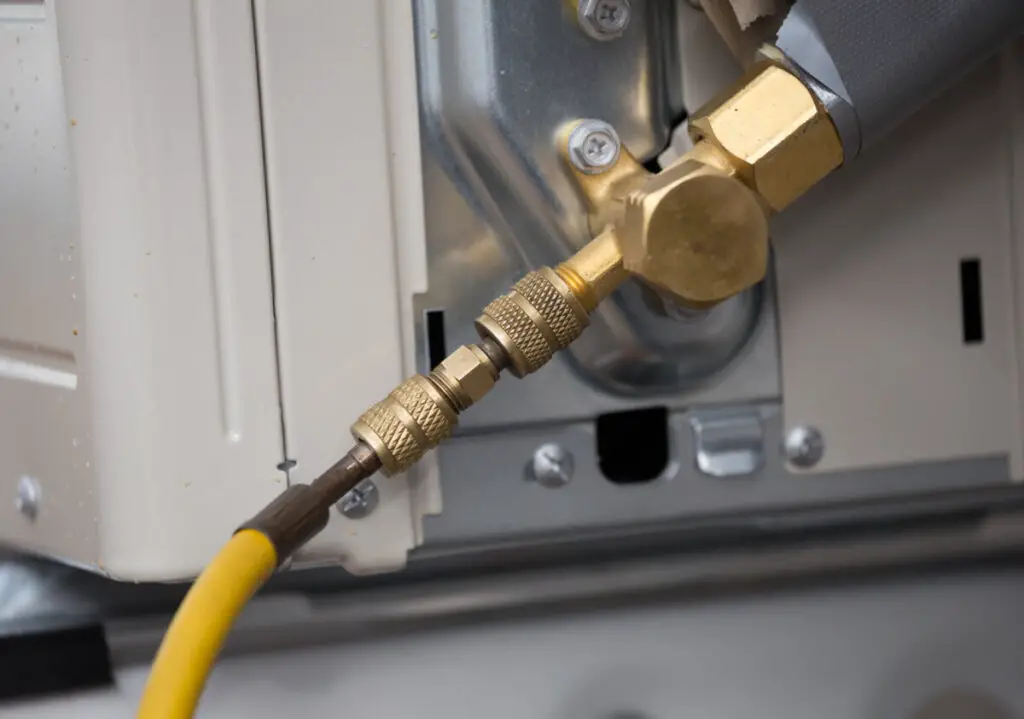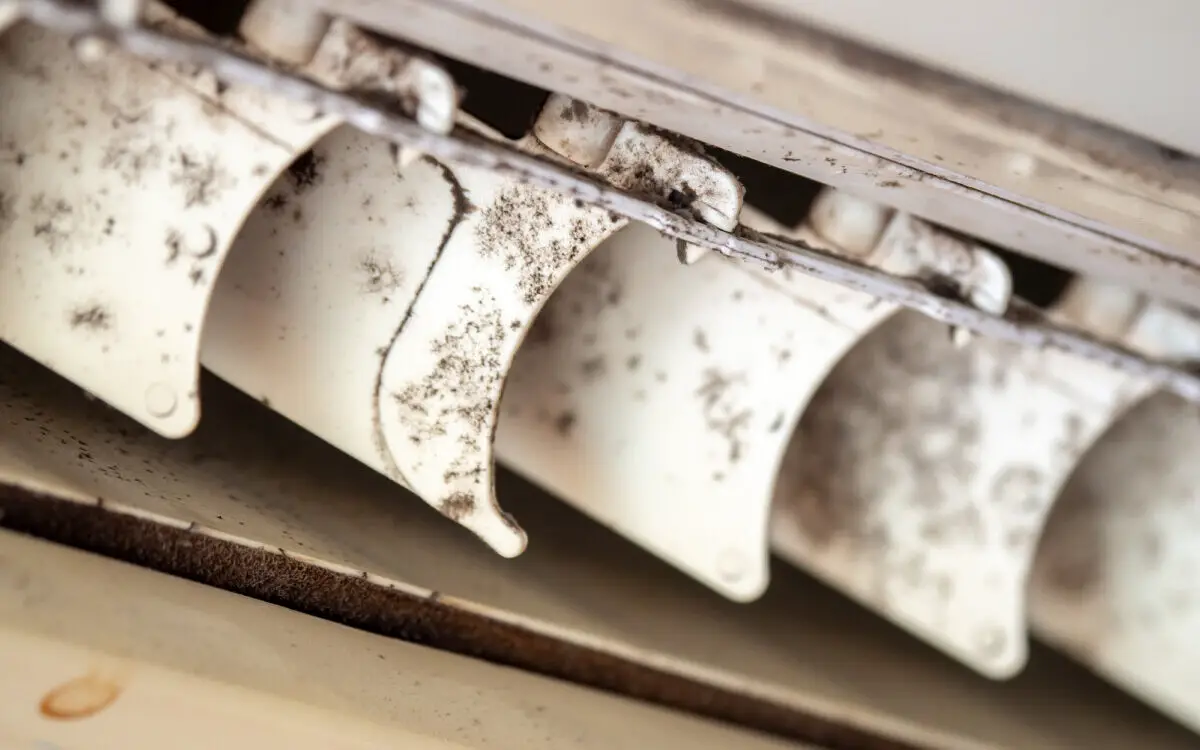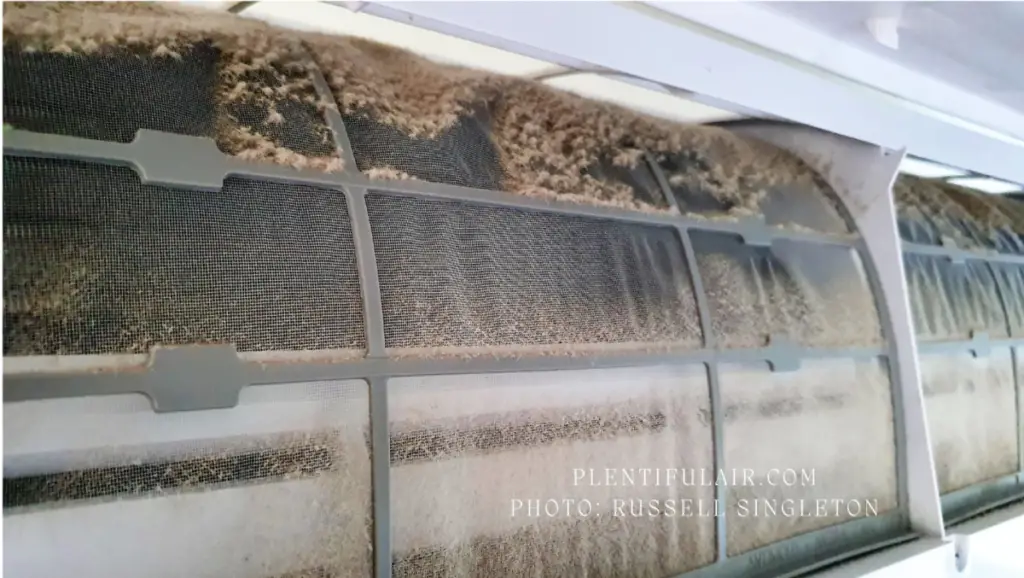If you’re like most people, you probably dedicate hours every week maintaining your home and car. There’s nothing more disappointing than coming home or getting in your car on a hot day to discover your air conditioner smells like rotten eggs.
A home or car air conditioner can smell like sulfur because of dead animals inside the vent, refrigerant gas leaks, mold buildup, or clogged air filters. Mold and gas leaks are the most common reason for an AC to smell like rotten eggs.
Because air conditioning units work by cooling the indoors, an unpleasant odor from the machine will quickly spread in your home or car. As a result, you may experience dizziness, headaches, nausea, and even vomiting. Luckily, however, you can track down the culprit and eradicate it to get rid of the toxic smell. Read on to learn how.
What Is Rotten Egg Smell?
It goes without saying that rotten eggs could be responsible for the smell of rotten eggs. However, it’s unlikely that’s the cause of your AC smelling bad – unless you’ve been storing your eggs there?
Hydrogen sulfide, a smelly gas, is the most common cause of the rotten egg odor.
The colorless and flammable gas smells like rotten eggs even when present in low concentrations. However, at extremely high concentrations, its smell is sickeningly sweet. The gas naturally exists in swamps, sulfur springs, and salt marshes.
It also comes from the decomposition of organic matter. Actually, there are even certain industrial and human activities such as tanneries, manure handling, and sewage treatment plants that can also produce a hydrogen sulfide smell.
The United States Department of Labor highlights that the gas is highly toxic, even in low concentrations. You can experience side effects from hydrogen sulfide exposure. The common symptoms include:
- Eye irritation
- Mild headaches
- Unconsciousness
Events reported by the Bureau of Labor Statistics (BLS) shed light on the potential dangers of hydrogen sulfide exposure. The gas (and it smell) caused the death of 46 workers between 2011 and 2017.
It isn’t wise to sleep on the unpleasant rotten egg odor as it can take a toll on your well-being. Immediately address and eliminate the cause to avoid exposure and associated health problems.
Reasons Why Your AC (House or Car) Smells Like Rotten Eggs or Sulfur
The reason your AC smells like rotten eggs can be different from that of your neighbor’s. For instance, you may have a dead animal inside the AC vents, while your neighbor may have a natural gas leak.
We’ve put together a list of issues that can lead to the sulfur smell coming from your AC. You can review all the points to spot your precise problem and take the appropriate solution.
Refrigerant Leak

A refrigerant gas leak is one of the most common causes of a rotten egg smell from your AC. Although refrigerant is naturally odorless, manufacturers add additives to the gas intentionally. The purpose behind this is straightforward: they want to alert you in case of a gas leak indoors.
Otherwise, the odorless gas can affect your health without you realizing.
Besides the rotten egg smell, here are a few other ways to confirm that it’s actually the gas leak contributing to the odor.
- You recently noticed that your AC doesn’t properly cool your home or car. Its cooling capacity is compromised even after turning it on for long hours.
- The moisture around the evaporator coils ice up, and you hear weird cracking sounds from the AC unit.
- The cooling pipes create a hissing sound.
Apart from the reasons mentioned above, your energy bills may also be soaring. All of the signs combined with a rotten egg odor confirm a gas leak.
What to Do
Here are a few steps you can take to fix a gas leak in your AC
- Open the doors and windows. Immediately turn off the system when you discover a rotten egg odor from your AC. Following this, open all the windows and doors to disperse the gas. As a safety measure, evacuate the premises for a while to let the air circulate.
- Contact an AC professional. We always recommend contacting an AC professional and letting them fix the gas leak.
- Fix the leak (DIY). Clean the AC valve thoroughly and then attach it back properly. Now, turn on the AC and observe the smell. If the odor persists, it’s time to seal the tube leak. You can consider soldering the tube crack across the leaking area (depending on the material of your tube). If the crack is big, or its plastic, replacing that section with a new tube piece is best.
- Schedule regular checkups. We aren’t new to the phrase, “Prevention is better than cure.” So, it’s best to schedule regular maintenance to keep your air conditioner in optimal condition and avoid potential problems.
Dead Animals

Homeowners rarely think about a dead animal in their AC vents because it creeps us to our core, “Are we breathing the decaying organic matter?” Of course, no health-conscious homeowner would be pleased to know they breathe dead organic matter.
Unfortunately, it isn’t uncommon for rats, mice, pigeons, and other birds to gain access to your AC ducts. This is more common during peak winter as animals seek shelter to keep themselves warm.
Over time, the animals may die, and their decomposing bodies distribute a nasty odor throughout your home on turning on the AC.
It might be gross to deal with decaying organic matter, but you must eliminate it.
What to Do
You need disinfectant, disposable gloves, a mask, and a plastic bag to remove the dead animal and disinfect the AC vents. Once you have your supplies, follow the steps below.
- Wear protective gloves and a mask
- Now reach the decaying matter and carefully pick it up
- Place the dead animal inside the plastic bag
- Put your gloves and mask inside the plastic bag to dispose of them
- Seal the bag and toss it away
- Use a quality disinfectant to disinfect the area before using your AC again.
Avoid turning on the AC for at least an hour after cleaning. Once the time frame passes, turn on your AC and make sure the odor has dissipated.
Plentiful Air has more information on how pests are attracted to air conditioners, and how to keep them out, available here.
Mold Buildup

Certain types of mold also emit a sulfur-like odor. Mold growth in your AC can contribute to your smelly problem. You can always check for moisture near the AC vents and mold growing in the AC unit.
Volatile sulfur compounds are produced by Schizophyllum commun, a type of fungi that also causes respiratory issues, including rhinosinusitis and basidiomycosis.
What to Do
The choices to clean mold buildup in your AC aren’t limited. We’ll highlight two popular methods to help remove the mold and get your AC functioning without odor.
Use a Laundry Detergent
- Turn off your air conditioning unit.
- Unbolt the vent grill and place it in a large basin filled with lukewarm water
- Add a few drops of laundry detergent and ensure the vent grill is fully submerged.
- Let the vent grill sit in the solution for 15 minutes
- Empty the basin and wipe the air vents with soapy water
- Use a disinfectant to kill the remaining bacteria and mold (make sure you thoroughly spray it within the AC vents)
- Air-dry the AC vents before placing them back
Baking Soda and Detergent
We recommend this method if the mold buildup is excessive. Baking soda combined with laundry detergent makes up for a heavy-duty solution to kill stubborn mold.
Follow the steps below to get started.
- Turn off the air conditioning unit.
- Add a tablespoon of laundry detergent and a tablespoon of baking soda in a large basin filled with warm water (you can increase the ratio if the mold is too stubborn)
- Unbolt the vent grill and drip it in the cleaning solution
- Thoroughly clean the vents using a soft-bristled brush (this will remove the tough mold accumulated on the AC vents)
- Dry the vent grills
- Put them back, and you’re all set
Turn on your AC after cleaning the mold. The rotten egg smell should have disappeared.
Dirty Air Filter

When was the last time you cleaned the air filter of your AC? If you can’t remember, a dirty air filter is probably the reason behind the rotten egg smell.
Sulfur from the air can accumulate in your AC system. So the dust and debris combined with high concentrations of sulfur can emit noxious odors.
What to Do
There’s no secret sauce to eliminating the rotten egg odor if a dirty air filter is causing the problem. You only need to clean the air filter, and it’ll eliminate the smell.
- Turn off the AC system. Turning off the unit ensures you’re not letting the unpleasant odor circulate throughout your property. Plus, you need to turn off the system anyway to remove the air filters.
- Remove the filter. Carefully uninstall the air filters. Depending on the unit model, it may have more than one filter.
- Vacuum it. Washing it right after uninstalling it isn’t wise because getting rid of wet debris would become even more difficult. Therefore, it’s best to vacuum the filters to lift the dust and debris. Cleaning the visible dust and debris would make the next steps easier.
- Wash it. Submerge the air filter in a basin filled with soapy water and gently rinse the filters. Note that the filters and delicate. So, you must not brush them; otherwise, they might get damaged.
- Reinstall it. Put the filters back after drying them thoroughly
Turn on the AC and see if the smell dissipated.
Sewage Problems

We’re all aware that sewage emits a nasty odor. However, few people know that a damaged or clogged sewer pipe near the AC duct system can fill the rotten egg stench in your home when you turn on the AC.
Sewage issues must be addressed right away. Delaying the treatment can lead to extensive problems and costly repairs.
What to Do
A broken drain pipe is not a DIY thing but rather requires professional repairs. So, consider contacting an AC professional and let them fix the damaged sewer pipe.
However, if a clog is a culprit, you can try to fix it yourself.
- Turn off the AC. It’s always better to switch off your AC and unplug it, even if it requires minor repairs.
- Identify the point of access. Track the pipe located outside, right beside the condenser unit. Inspect the T-shaped vent with a covering on the drain top.
- Spot the clogs. Observe the pipe closely to spot what’s blocking the pipe.
- Remove the twigs and insects. If you see twigs and insects inside the pipe, you can remove them using a snake device. It’s a long flexible strap used to push up the pipes. Pushing and pulling the snake up and down will help eliminate the obstructions.
- Flush with vinegar solution. The powerful cleaning properties of vinegar can help unclog the blockages. Mix the vinegar with warm water and pour it into the drain pipe. Leave the solution for a few minutes before flushing it down.
- Repeat monthly. Repeating the unclogging process every month ensures optimal functioning of the drain pipes and helps avoid nasty odors that may spread due to clogs.
Frequently Asked Questions
Does Refrigerant Smell Like Rotten Eggs?
Yes, refrigerant smells like rotten eggs. In fact, a refrigerant leak is one of the most common causes of sulfur odor coming from your AC. Hence, it does smell like sulfur.
Note that refrigerant is naturally odorless. However, manufacturers introduce additives to give a foul odor to the gas. The purpose is to alert the household owners about the gas leak.
How Do You Fix a Smelly Air Conditioner?
Cleaning the drain line and washing the air filters are one of the best methods to fix a smelly air conditioner. However, this varies per your unique problem. For instance, if a dead rodent in the AC vent is the culprit, cleaning the air filters won’t help.
Make sure you identify the cause of the smelly air conditioner before approaching the problem. Refer to the “Reasons Why Your AC Smells Like Sulfur/Rotten Eggs” section to learn about a smelly air conditioner precise causes and solutions.
Generally, mold buildup, dirty air filters, clogged drain lines, gas leaks, and dead animals in AC vents contribute to nasty odors. We recommend using an air purifier besides taking the solutions discussed above.
If nothing seems to fix the smell coming from your AC, contact a professional and have your AC inspected.
